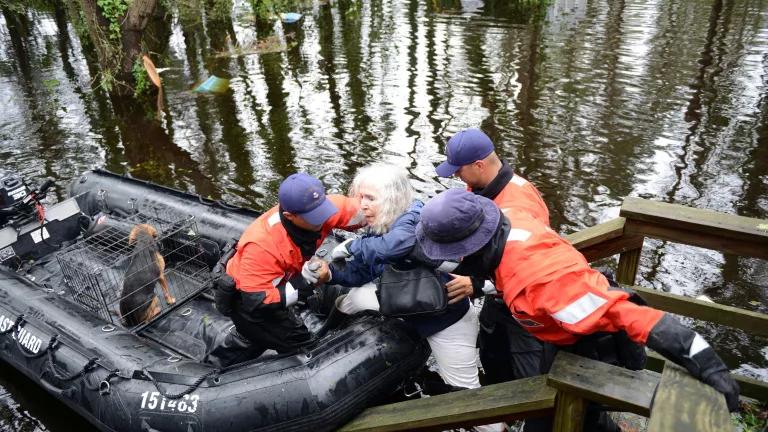It’s heart-breaking to see the tens of thousands of people still struggling without power in the wake of SuperStorm Sandy—especially as the temperature drops below freezing. And to hear the stories, like the one of the woman whose two and four year-old sons were torn from her arms and drowned as rushing storm water overwhelmed her efforts to escape from her stranded vehicle in New York City.
The destroyed homes, apartments and businesses, the lost loved ones, and the people all struggling to rebuild lives strike at the heart of one of our most primal fears and instincts—security.
A report issued last week by the American Security Project (ASP), which includes some highly respected retired military leaders and a group of bi-partisan government officials, makes the stark case that global warming-driven increased extreme weather patterns and events pose one of the largest to our national security.
The study states that "Environmental threats blur traditional notions of national security: Secure states do not automatically mean secure people, and climate change is proving that.”
ASP CEO, (Ret.) Marine Corps Brigadier Stephen Cheney, added at the report’s release:
One of the most significant challenges to the global security system in the 21st Century will be a changing climate. Climate change poses a clear and present danger to the United States through its effects on our global allies as well as its direct effects on our agriculture, infrastructure, economy and public health. The impact of Hurricane Sandy shows that this is a threat today. The (report) aims to move past the current debate about climate change and towards a real, informed discussion about its security implications—both global and domestic.
The national security-focused institution notes that there is no certainty, only uncertainty, on the battlefield, and that the same is true for climate change. Thus the United States must be ready for contingencies, and strategic planning for these contingencies will render the U.S. more secure, helping to ensure global stability in a warming world.
ASP Board Member and former EPA Administrator and Governor of New Jersey, added:
There will be costs to our economic security from climate change — and significant ones at that — if we do nothing but continue business as usual. We are seeing all sorts of issues that come from climate change and we must adapt to them. This summer’s drought throughout the Midwest is just the tip on the kind of changes we can expect from a rapidly (in nature’s terms) changing climate.
The ASP report is by no means the first to connect national security with climate change. Perhaps most significant among these is the federal Quadrennial Defense Review (QDR), a legislatively-mandated review of Defense Department strategy and priorities. The most recent QDR states: “Climate change and energy are two key issues that will play a significant role in shaping the future security environment. Although they produce distinct types of challenges, climate change, energy security, and economic stability are inextricably linked.”
The United States Global Change Research Program (which includes the Department of Defense, NASA, National Science Foundation and other government agencies) has said that "global warming is unequivocal and primarily human-induced" and that "climate changes are underway in the United States and are projected to grow."
Last year, the National Research Council, at the urging of the Chief of Naval Operations, issued National Security Implications of Climate Change for U.S. Naval Forces. In conducting its study, the committee found that even the most moderate current trends in climate, if continued, will present new national security challenges for the U.S. Navy, Marine Corps, and Coast Guard.
The national security community is taking steps to reduce its own role in adding to the pollution that causes climate change. The Department of Defense has a stated goal of reducing their global warming pollution from non-combat operations 34 percent below 2008 levels by 2020.
But if we are ever to have a chance at staving off the worst impacts of climate change—storms more severe than Sandy—we need to show leadership by significantly cutting our climate pollution nationally, and work to ensure other big emitting countries follow suit.
We owe nothing less to the victims of Sandy.



